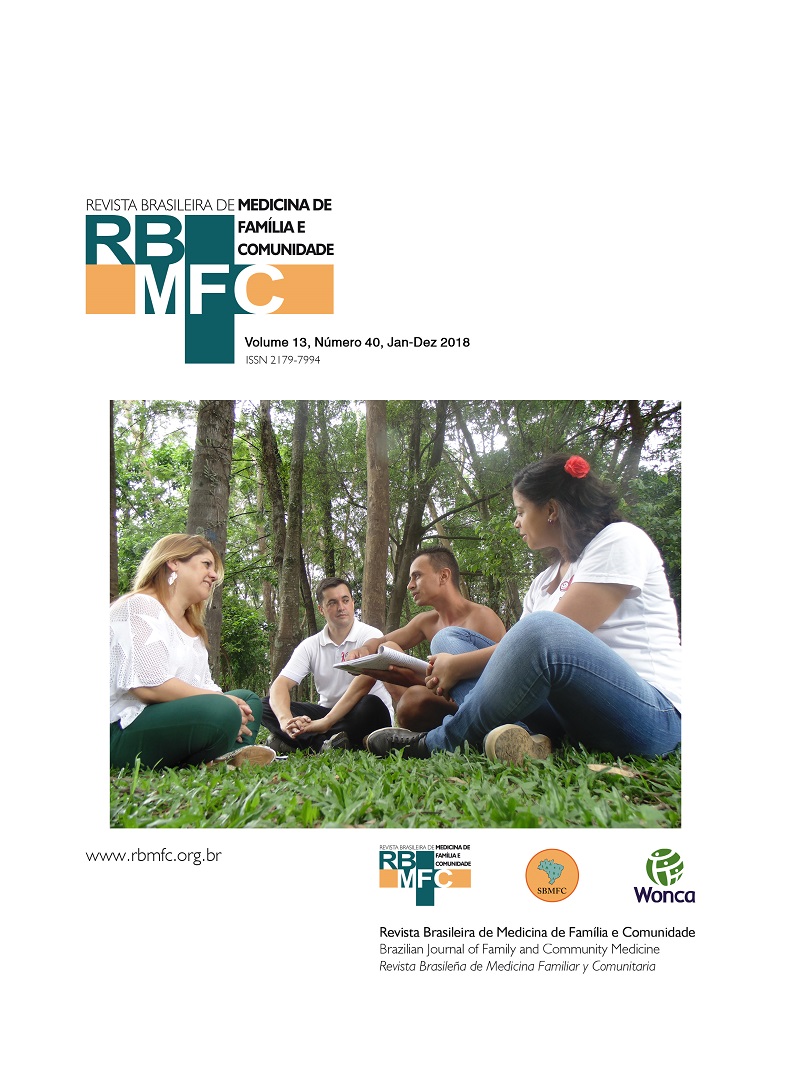It is time for rural training in family medicine in Brazil!
DOI:
https://doi.org/10.5712/rbmfc13(40)1696Keywords:
Rural Health, Education, Medical, Family Practice.Abstract
The gap between health needs and the training of human resources for health is much more evident in rural areas. In Brazil, a country of continental dimensions, these differences become more challenging. The diversity of geographical and administrative barriers to access makes the health indicators of rural and remote populations worse than those of the urban population. Family Medicine could address the social determinants of health through the provision of human services and play an important role in low-income rural residents’ health status. This essay is an urgent call for the debate on models for projecting heath workforce supply and requirements for rural areas in Brazil.
Downloads
Metrics
References
WHO. Increasing access to health workers in remote and rural areas through improved retention [Internet]. Vol. 23. Sciences, New York; 2010. Available from: http://www.who.int/entity/hrh/migration/hmr_expert_meeting_dolea.pdf
Targa L, Wynn-Jones J, Howe A, Anderson M, Lopes J, Lermen-Junior N, et al. Declaração de Gramado pela Saúde Rural nos países em desenvolvimento. Revista Brasileira de Medicina de Família e Comunidade [Internet]. 2014 Jul 30 [cited 2018 Feb 22];9(32):292-94. DOI: http://dx.doi.org/10.5712/rbmfc9(32)982 DOI: https://doi.org/10.5712/rbmfc9(32)982
Strasser R. Rural health around the world: challenges and solutions [Internet]. Fam Pract. 2003 Aug 1;20(4):457-63. DOI: http://dx.doi.org/10.1093/fampra/cmg422 DOI: https://doi.org/10.1093/fampra/cmg422
IBGE. Pesquisa Nacional de Saúde 2013 [Internet]. Instituto Brasileiro de Geografia e Estatística (IBGE). 2014; p. 181. Available from: ftp://ftp.ibge.gov.br/PNS/2013/pns2013.pdf
Tudor Hart J. The Inverse Care Law. Lancet [Internet]. 2018 Feb 24;297(7696):405-12. DOI: http://dx.doi.org/10.1016/S0140-6736(71)92410-X DOI: https://doi.org/10.1016/S0140-6736(71)92410-X
Reid S, Worley P, Strasser R, Couper I, Rourke, J. ‘What brings us together’: The values and principles of rural medical education. In: Chater AB, Rourke J, Couper ID, Strasser RP, Reid S (eds.). WONCA Rural Medical Education Guidebook. World Organization of Family Doctors (WONCA): WONCA Working Party on Rural Practice, 2014 [accessed 2017 Jun 04]. Available from: www.globalfamilyldoctor.com
Howe A, Ives G. Does community-based experience alter career preference? New evidence from a prospective longitudinal cohort study of undergraduate medical students. Med Educ [Internet]. 2001 Apr 22 [cited 2018 Feb 25];35(4):391-97. DOI: http://dx.doi.org/10.1046/j.1365-2923.2001.00866.x DOI: https://doi.org/10.1046/j.1365-2923.2001.00866.x
Wilson NW, Couper ID, De Vries E, Reid S, Fish T, Marais BJ. A critical review of interventions to redress the inequitable distribution of healthcare professionals to rural and remote areas. Rural Remote Health. 2009;9(2):1060.
Girardi SN, Carvalho CL, Pierantoni CR, Costa J de O, Stralen AC de S van, Lauar TV, et al. Avaliação do escopo de prática de médicos participantes do Programa Mais Médicos e fatores associados. Ciênc saúde coletiva [Internet]. 2016;21(9):2739-48. DOI: http://dx.doi.org/10.1590/1413-81232015219.15912016 DOI: https://doi.org/10.1590/1413-81232015219.15912016
Downloads
Published
How to Cite
Issue
Section
License
By submitting a manuscript to the RBMFC, authors retain ownership of the copyright in the article, and authorize RBMFC to publish that manuscript under the Creative Commons Attribution 4.0 license and identify itself as the vehicle of its original publication.















